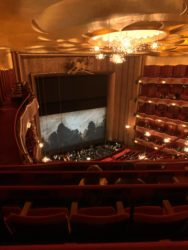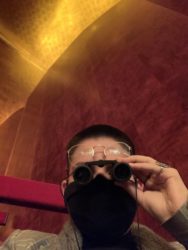Senior Staff Writer James Perry guides you through a night at the Metropolitan Opera House.
So, you’ve run out of ways to impress your friends and family with your status as a Columbia student. Tales of your valiant exploits (completing problem sets a few minutes before their midnight deadline) and intellectual pursuits (going to Butler to study but ending up on your phone) have grown passe; you need a new way to feel like you’re fulfilling the city’s fine culture potential. Fear not! You can feel intellectual, cultured, and rich without having to spend hundreds of dollars by going to see a show at the Metropolitan Opera.
I spent this Wednesday evening seeing a production of Eurydice, composed by Matthew Aucoin with a libretto by Sarah Ruhl. The Met Opera is pretty convenient to get to from campus; you can take the 1 straight to Lincoln Center and the opera house will be just around the corner. Approaching Lincoln Center half an hour before the show began, I already felt the excitement and pseudo-intellectualism oozing from all of the people taking pictures in front of the fountain; while a lot of the crowd were tourists (arguably, the ultimate in pretentiousness in some cases), many groups were discussing the opera as I passed by. Almost everyone was in formalwear; I spotted several floor-length gowns and full suits, even in the nosebleed seats. Two old Italian ladies were sitting next to me and discussing some information in the playbill—in Italian, of course, making me feel like I had real opera fans sitting next to me. After fumbling with the opera glasses I had rented at the coat check (which I’m certain those ladies judged me for), I took a page from their book and began to flip through the playbill.

the view from my seat! 
opera glasses rental
“Alas! I don’t know anything about the opera! I don’t know Italian! How do I go and enjoy an opera without feeling like an idiot?!” you might say. Here’s the secret: you don’t have to know anything. Each seat has a little subtitle screen in front of it; if the production you happen to see is in French, or Italian, or some other pretentious language you don’t know, translations of the lyrics are shown on that little screen, perfectly aligned with the music. If you can’t grasp the plot through reading the lyrics, the playbills have a synopsis of the show in them that includes small details you may not have noticed. If you don’t want to put a lot of effort into critical thinking, there’s also short essays about the writing of the opera, the performers’ experiences in the production, and similar subjects in the playbill.
That and a little bit of terminology is all you need to begin a deep dive into this new brand of pretentiousness. In an opera, singers’ voices are classified by how they sound, and each part in an opera is written for a certain type of voice. For men, voices are classified into bass (deep), baritone (medium), tenor (high), and countertenor (super high), with some in between. For women, voices are classified into contralto (deep), mezzo-soprano (medium), and soprano (high). For example, after seeing an opera, you might say something like, “Mmyes, all of the roles balanced with each other beautifully, but I found that the contralto’s voice was a little off-putting in the duet with the countertenor,” and insert some detail you read in the playbill.
Beyond what you might gain to display your pretentiousness after the show, even attending is an experience in luxury. While I had rushed to get my opera glasses and find my seat before curtain time, I ventured out into the lobby during intermission. The crystal chandeliers glittered, and so did the people around me as they reveled in the atmosphere. Below, people were sipping from champagne flutes and dining on a balcony. I only slipped a little on the red velvet carpeting.
If that sounds appealing to you, you might want to head over to the Met’s website and check out their 2021-22 season shows. Normally, tickets start at $30 for seats in the nosebleeds or seats with obstructed views. This price, in my opinion, was quite reasonable for this kind of experience, and being far from the stage wasn’t a very great inhibitor because of the opera glasses that were available for rental. If you’re more prone to making spur-of-the-moment decisions, rush tickets go on sale earlier on the day of a show and start at $25. But that sweet, sweet student discount? You have to fill out a form to be eligible to purchase student tickets, and all you need is a picture of your CUID. If you do that, you can sign up for emails about special offers available to students.
With all of that information under your belt, you’re ready for a night at the opera! Go forth and be pretentious!
images via the opera expert themselves


 0 Comments
0 Comments